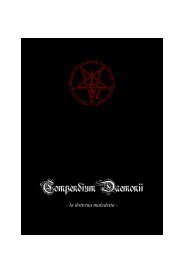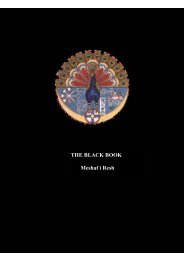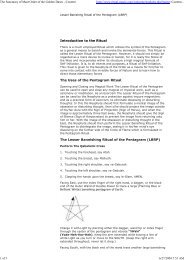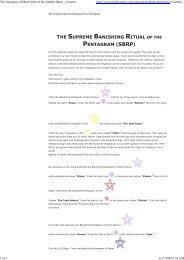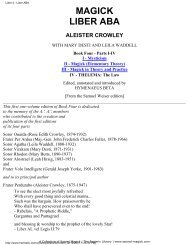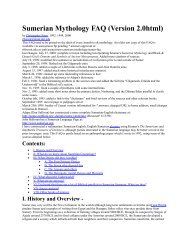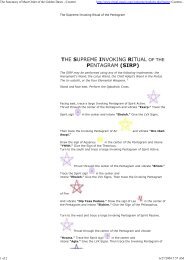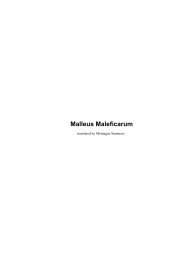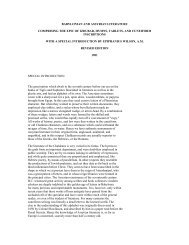- Page 1 and 2:
THE ALCHEMY KEY Unraveling the Sing
- Page 3 and 4:
I dedicate this work to the Alchemi
- Page 5 and 6:
Published by Stuart Nettleton ISBN
- Page 7 and 8:
Contents Chronology iv Preface 1 In
- Page 9 and 10:
Chronology Yrs Ago Indo-Hittite Afr
- Page 11 and 12:
BCE Mesopotamia Egypt Israelite 195
- Page 13 and 14:
BCE Greek BCE Israelite / Jewish 63
- Page 15 and 16:
Israelites, Freemasons and Rosicruc
- Page 17 and 18:
surprisingly small number of themes
- Page 19 and 20:
Introduction Leaning on my elbow, I
- Page 21 and 22:
in a yearly cycle, embody the compl
- Page 23 and 24:
used, which derives from Judah. The
- Page 25 and 26:
hydrochloric acid. Anything that do
- Page 27 and 28:
Great Work of the alchemists, but i
- Page 29 and 30:
chapter, we delve a little further
- Page 31 and 32:
Rhodium % Iridium % 18 Monatomics %
- Page 33 and 34:
1a 2a 3b 4b 5b 6b 7b 8 1b 2b 3a 4a
- Page 35 and 36:
Other test tube studies with pure m
- Page 37 and 38:
volcanic ore. 25 His plant uses six
- Page 39 and 40:
Flavius Josephus warrants a brief c
- Page 41 and 42:
archetypes or if the archeologists
- Page 43 and 44:
to rule Southern Egypt. Kings from
- Page 45 and 46:
sword that I will send among them
- Page 47 and 48:
The letters AUM also stand for the
- Page 49 and 50:
serpent of Wisdom. The phases of th
- Page 51 and 52:
men will often exuberantly contest
- Page 53 and 54:
and the true crocus sativus. 109 Ea
- Page 55 and 56:
Ramesses III (1194-1163BCE) Thebian
- Page 57 and 58:
murdered husband Osiris and the rea
- Page 59 and 60:
Cluster Analysis of Data by Nei and
- Page 61 and 62:
Factor Analysis of Nei and Roychour
- Page 63 and 64:
50 20m ya 10m ya Pliocene 5m ya 40,
- Page 65 and 66:
Emergence of the Afro-Asiatic Langu
- Page 67 and 68:
54 20m ya 10m ya Pliocene 5m ya 40,
- Page 69 and 70:
thousand years ago. Solo Man, the A
- Page 71 and 72:
land bridge was unavailable, the Mo
- Page 73 and 74:
The Indo-Hittite movements came fro
- Page 75 and 76:
Drifting Semites from the Arabian p
- Page 77:
Chapter 5 Anatolian Commagene & Isr
- Page 80 and 81:
Campaigns of Sesôstris I to Buhen
- Page 82 and 83:
what convinces me that the other pe
- Page 84 and 85:
The Quirites of Rome came from the
- Page 86 and 87:
• heads taken in battle and carri
- Page 88 and 89:
In Kenite lore, the divine smith Tu
- Page 90 and 91:
Reddened the stones. Medea set out
- Page 92 and 93:
witnessed a surprising incident in
- Page 94 and 95:
their lover, whom they had clad in
- Page 96 and 97:
prophetess, intolerant of Phoebus
- Page 98 and 99:
The Priests ruled that a Jewish gir
- Page 100 and 101:
Isaac’s bride is Rebecca the wate
- Page 102 and 103:
In contrast are the Indo-Hittite ma
- Page 104 and 105:
payment could substitute. 318 When
- Page 106 and 107:
directly to recorded Egyptian campa
- Page 108 and 109:
Chapter 6 Hyksos Invasion of Egypt
- Page 110 and 111:
elevated the Amorites Meri-Re and U
- Page 112 and 113:
new wonder Indo-Iranian technology
- Page 114 and 115:
towards the Commagene and won a dec
- Page 116 and 117:
and he was present in Egypt in 1460
- Page 118 and 119:
Although Tutankhamen appointed Hore
- Page 120 and 121:
year legal challenge in which Mose
- Page 122 and 123:
The Biblical Moses was Ra Meses, a
- Page 124 and 125:
WYBA BYN MChNH MTzRYM WBYN MChNH YS
- Page 126 and 127:
Chapter 7 The Name of God, the Merk
- Page 128 and 129:
She was the Queen of Heaven and God
- Page 130 and 131:
Ineffiable Name of God from the hol
- Page 132 and 133:
Hitchhikers Guide to the Galaxy, fo
- Page 134 and 135:
elieved that souls passed through t
- Page 136 and 137:
seen, is Mercy in Judgment. Thus me
- Page 138 and 139:
Archbishop: Receive this Orb, set u
- Page 140 and 141:
Chapter 8 Sabians of Harran and Yem
- Page 142 and 143:
came to mourn for Sarah, and to wee
- Page 144 and 145:
The main temples indicate an advanc
- Page 146 and 147:
Oxus (Amu Darya) and Jaxartes (Syrd
- Page 148 and 149:
in and around Harran, strengthening
- Page 150 and 151:
of war because of their secluded po
- Page 152 and 153:
in the Gulf of Cambay raised consid
- Page 154 and 155:
to resist all Greek and other forei
- Page 156 and 157:
common person toward a scholar is e
- Page 158 and 159:
Chapter 10 Zaddoki & Jesus All the
- Page 160 and 161:
Kiyumars, the first Indo-Iranian ki
- Page 162 and 163:
the people into idolatry. 546 In 70
- Page 164 and 165:
survived. A combination of Pharisee
- Page 166 and 167:
Chapter 11 Melchizedekians and Mero
- Page 168 and 169:
Bezaleel and Hiram Abiff are also s
- Page 170 and 171:
However, in response to the fanatic
- Page 172 and 173:
dynasty. Eight years later Pepin II
- Page 174 and 175:
Following Godefroi de Bouillon’s
- Page 176 and 177:
mixture of history and tradition, t
- Page 178 and 179:
sons were priests to the Tribe of D
- Page 180 and 181:
son of Bel or Belus, who is the Baa
- Page 182 and 183:
Irish histories record that Ollamh
- Page 184 and 185:
Jeremiah took Zedekiah’s daughter
- Page 186 and 187:
The English finally returned the my
- Page 188 and 189:
The church historian Bede wrote how
- Page 190 and 191:
the Helenephoria after the Goddess
- Page 192 and 193:
subjoined attests. Onias received t
- Page 194 and 195:
ecause she bore Apollo there. 684 .
- Page 196 and 197:
The early name of the British count
- Page 198 and 199:
America in a time called the Atlant
- Page 200 and 201:
eigning over the Jews. Therefore, t
- Page 202 and 203:
In summary, Jacob had said Dan woul
- Page 204 and 205:
Ammishaddai, Captain of the childre
- Page 206 and 207:
in hierarchical order; a unique con
- Page 208 and 209:
tablet and discovered the second pi
- Page 210 and 211:
a state religion. It crystallized i
- Page 212 and 213:
Parfaits escaped, including Amiel A
- Page 214 and 215:
Chapter 14 Ancient Alchemy The name
- Page 216 and 217:
2. Seven bodies: silver, gold, copp
- Page 218 and 219:
Fishing for Coral from Atalanta fug
- Page 220 and 221:
and the stable chloride ion (AuCl4
- Page 222 and 223:
Death. Chapter 18 showed that it al
- Page 224 and 225:
contain items of tin rather than le
- Page 226 and 227:
in particular. It was the black pow
- Page 228 and 229:
pulverized Stibnite; 1 part Iron po
- Page 230 and 231:
coal-black powder called the Crows
- Page 232 and 233:
distilled and reused but is more of
- Page 234 and 235:
unbelievably wealthy with gold and
- Page 236 and 237:
Q. Whence are they derived? A. I ha
- Page 238 and 239:
THE FIRST BOOKE OF THE FAERIE QVEEN
- Page 240 and 241:
ase nature was a pyrrhic victory -
- Page 242 and 243:
Historical fundamentalists identify
- Page 244 and 245:
Consistent with this, the Gospel of
- Page 246 and 247:
Crucified Serpent from the titlepag
- Page 248 and 249:
Cinyras and Smyrna shows the correc
- Page 250 and 251:
Shakespeare’s King Lear was aged
- Page 252 and 253:
with the object of Good Fellowship.
- Page 254 and 255:
Medea, Jason becomes invincible and
- Page 256 and 257:
Before concluding this phase of our
- Page 258 and 259:
The Green-Eyed Monster causes much
- Page 260 and 261:
eternity. God appeared to Unas and
- Page 262 and 263:
Give me joy to live That is not yet
- Page 264 and 265:
leaves green and flowers white. Hom
- Page 266 and 267:
Archaic Temples of the Mysteries On
- Page 268 and 269:
one part of linseed oil, and grind
- Page 270 and 271:
The appearance of the lilac Philoso
- Page 272 and 273:
tell you, if it could be lawfully t
- Page 274 and 275:
the wife of Zebedee. Yet, this is n
- Page 276 and 277:
Sirius in a fiery Vesica Piscis Con
- Page 278 and 279:
Queen Elizabeth 1 attended by the T
- Page 280 and 281:
Elizabeth I commanding the Ship Eur
- Page 282 and 283:
Eubulus greeteth thee, and Pudens,
- Page 284 and 285:
George were both reminders that Bri
- Page 286 and 287:
The Nephilim had many different nam
- Page 288 and 289:
Midrash, the Messiah will have the
- Page 290 and 291:
oth which. This damask rose doth we
- Page 292 and 293:
naturally opposed elsewhere flouris
- Page 294 and 295:
For what we pressage is not in gros
- Page 296 and 297:
In concert with the widespread repr
- Page 298 and 299:
World One is the material world; Wo
- Page 300 and 301:
However, in drafting the US constit
- Page 302 and 303:
These supernova explosions occurred
- Page 304 and 305:
fire. 1140 Red Phrygian caps signif
- Page 306 and 307:
Great and pious architects such as
- Page 308 and 309:
prince of the royal house of Assara
- Page 310 and 311:
celestial map for the terrestrial l
- Page 312 and 313:
The Enfants de Solomon or Children
- Page 314 and 315:
The Green Man’s image as the male
- Page 316 and 317:
Kids entering and two Boars, repres
- Page 318 and 319:
Looking at him with ruthless eyes,
- Page 320 and 321:
Tenor and Choir Joyously, as his su
- Page 322 and 323:
This meeting place is analogous to
- Page 324 and 325:
whole plan. It is potable water fed
- Page 326 and 327:
Many believe this place was the isl
- Page 328 and 329:
is the Rite of the Jesuit Chapter o
- Page 330 and 331:
quite intriguing. On 10 August 1744
- Page 332 and 333:
endeavored to broker a solution bef
- Page 334 and 335:
they and the brethren of St John of
- Page 336 and 337:
Wisdom, is also feminine. This is j
- Page 338 and 339:
available publications seem to supp
- Page 340 and 341:
The eagle is also the symbol of Jup
- Page 342 and 343:
nehushtan into pieces to prevent it
- Page 344 and 345:
majority of Indo-Hittite myths, inc
- Page 346 and 347:
I would like to tell you certain th
- Page 348 and 349:
the East would have involved sexual
- Page 350 and 351:
Sesôstris I offering Shewbread to
- Page 352 and 353:
Shewbread is Offered to Anubis Guar
- Page 354 and 355:
Covenant, large tabernacle items li
- Page 356 and 357:
influence of the Essenes of Egypt,
- Page 358 and 359:
whom were, he felt, lacking in fait
- Page 360 and 361:
precious lamps decorate churches, i
- Page 362 and 363:
documents in three encased boxes, a
- Page 364 and 365:
Many of these fringe groups were re
- Page 366 and 367:
flows into all the vessels of the b
- Page 368 and 369:
Caleb seems to have taken the machi
- Page 370 and 371:
long passage, five hundred spans un
- Page 372 and 373:
number of Cistercian monasteries ev
- Page 374 and 375:
Collegiate Church extends thirty me
- Page 376 and 377:
The Shepherds’ Monument (Shugboro
- Page 378 and 379:
Les Bergers d'Arcadie II (Nicolas P
- Page 380 and 381:
The Arcadian Shepherds (Il Guercino
- Page 382 and 383:
Additional Ossary Vegetation God &
- Page 384 and 385:
Mirror Reversal of Shepherds’ Mon
- Page 386 and 387:
Remember, it was Caleb who said: 14
- Page 388 and 389:
small depression following each let
- Page 390 and 391:
Louis de Bourbon-Condé was also Gr
- Page 392 and 393:
light of this flame enabled the Kni
- Page 394 and 395:
Chapter 16 investigated the importa
- Page 396 and 397:
Conclusion The goal of this book ha
- Page 398 and 399:
alchemists’ experiments of trial,
- Page 400 and 401:
change in color is evidenced. The 6
- Page 402 and 403:
of the yellow liquid. Completely dr
- Page 404 and 405:
Technical Description of the Proces
- Page 406 and 407:
smell and very beautiful colors and
- Page 408 and 409:
Philosophers, when they have thus p
- Page 410 and 411:
Mariae. Then distil all the Spiritu
- Page 412 and 413:
In cases of all kinds of hot fevers
- Page 414 and 415:
increasing ever more, so that a sin
- Page 416 and 417:
5. Allow the slurry to settle overn
- Page 418 and 419:
came; it was so clear that none but
- Page 420 and 421: Into this sinful world from heaven
- Page 422 and 423: But the third tribute more successf
- Page 424 and 425: Was all that made a diff'rence to t
- Page 426 and 427: y the Stolista (Baptiser) and accep
- Page 428 and 429: procession an Assembly was held in
- Page 430 and 431: h 2 = ½ .s.√(s 2 /4 + h 2 ) and
- Page 432 and 433: the middle of the pyramid’s base
- Page 434 and 435: Julius Caesar’s dimensions of anc
- Page 436 and 437: Royal Star of David It is a surpris
- Page 438 and 439: Appendix 9 A Note on the Scholar Ro
- Page 440 and 441: particular number of steps to shift
- Page 442 and 443: volume was provided with the lot. A
- Page 444 and 445: NOTAMARGATET, -- bless that circle
- Page 446 and 447: Appendix 12 Painted Ceilings at Cra
- Page 448 and 449: The Green Lady’s Room Beam 1 A ma
- Page 450 and 451: The goode man sall give inheritance
- Page 452 and 453: Moreover, Jeremiah complains that e
- Page 454 and 455: The Altar of Sacrifice Ezekiel dism
- Page 456 and 457: effigy of the dead God, which was w
- Page 458 and 459: Many competent critics now consider
- Page 460 and 461: aces the belief is current that the
- Page 462 and 463: the rock of sacrifice, beneath whic
- Page 464 and 465: present position in a Speculative L
- Page 466 and 467: of them in a more decent form survi
- Page 468 and 469: to those in authority, because no o
- Page 472 and 473: called Essenes or at any rate had a
- Page 474 and 475: 30 I Maccabees 1:21-23 31 Josephus
- Page 476 and 477: 125 Isaiah 48:2 126 Bernal, Vol 1,
- Page 478 and 479: 214 Eliade, p99 215 Graves, 1961, p
- Page 480 and 481: 317 Jeremiah 7:31 & 32; see also Gr
- Page 482 and 483: 417 Genesis 36:13 & 17, 1 Chronicle
- Page 484 and 485: 511 Zoroastrian Holy Book Bundahish
- Page 486 and 487: 610 Judges 3:3 & I Chronicles 5:23
- Page 488 and 489: 711 Genesis 49:9 712 Deuteronomy 33
- Page 490 and 491: 805 Graves, 1961, p177 806 Lambert,
- Page 492 and 493: 898 Levi, 1913, p87 899 Ovid ‘Med
- Page 494 and 495: 998 Gilbert, 1996, p151 999 Dawkins
- Page 496 and 497: 1093 Adamson 1094 MS.Ashm. 1417, p4
- Page 498 and 499: 1189 Ward, 1921, p146 1190 Wren, 17
- Page 500 and 501: Charter was forged by Régent de Fr
- Page 502 and 503: 1380 Favier, p76 1381 Yarker, [1909
- Page 504 and 505: 1467 Scholem, p338 1468 Daniel 5:5
- Page 506 and 507: Begg, Ean & Deike ‘In Search of t
- Page 508 and 509: University of Pennsylvania, Philade
- Page 510 and 511: Higgins, Godfrey ‘Anacalypsis, an
- Page 512 and 513: Mayor, Adrienne ‘Mad Honey!’ Ar
- Page 514 and 515: Prichard, James (ed) ‘Solomon and
- Page 516 and 517: Wildung, Dietrich ‘Egypt,: From P
- Page 518 and 519: Alcmena, 221 Alembic, 215 Alexander
- Page 520 and 521:
Assembly of the Gods, 135 Assideans
- Page 522 and 523:
Book of Splendor, 15, 353 Book of t
- Page 524 and 525:
Christianity, British Imperial, 162
- Page 526 and 527:
Day of Willows, 36 de Vere, Richard
- Page 528 and 529:
Ephrath, 272 Epigoni, 209 Eratosthe
- Page 530 and 531:
Ginzberg, Louis, 461, 496 Gisors, 1
- Page 532 and 533:
helium-3, 461 hemlock, 82 hemorrhoi
- Page 534 and 535:
Indo- European, 60 Indo-Aryan, 60 I
- Page 536 and 537:
Judgment, 119, 121, 133, 145, 356,
- Page 538 and 539:
light, 8, 117, 129, 130, 245, 247,
- Page 540 and 541:
Megiddo, 42, 43, 100 Meissner Field
- Page 542 and 543:
Naharin, 27, 100 Najmoddin Kobra, 2
- Page 544 and 545:
Paneas, 164 Paneas, source of Jorda
- Page 546 and 547:
Potsdam, 316, 502 Poussin, Nicholas
- Page 548 and 549:
Rose of Sharon, 38, 39, 276 Rose Wi
- Page 550 and 551:
Septimius Severus, 462 Septuagint,
- Page 552 and 553:
star gate, 264 Star of Bethlehem, 2
- Page 554 and 555:
Triple Goddess, 35, 83, 84, 118, 15
- Page 556:
Witt, Reginald, 488, 489, 504 Wolff



